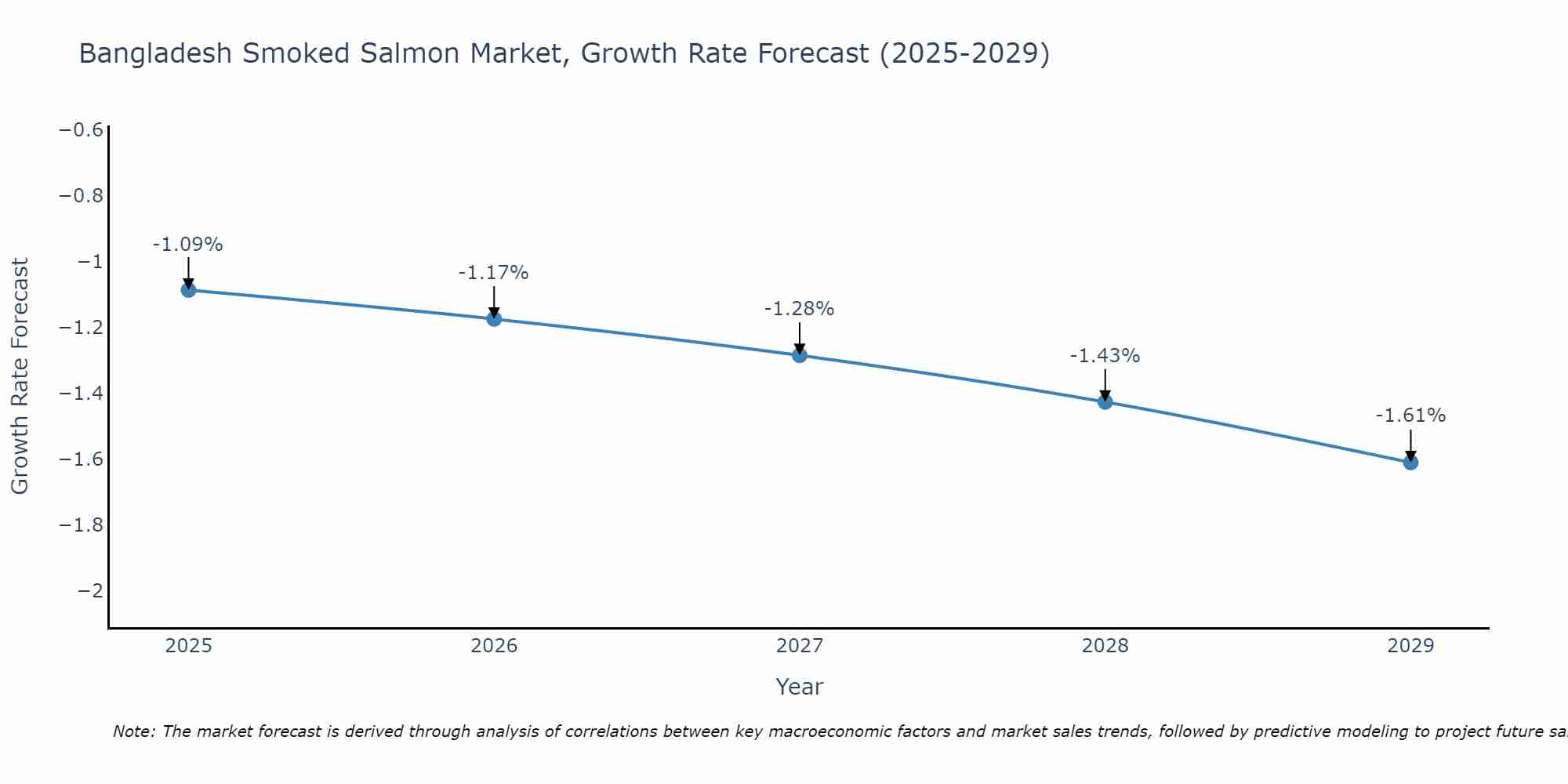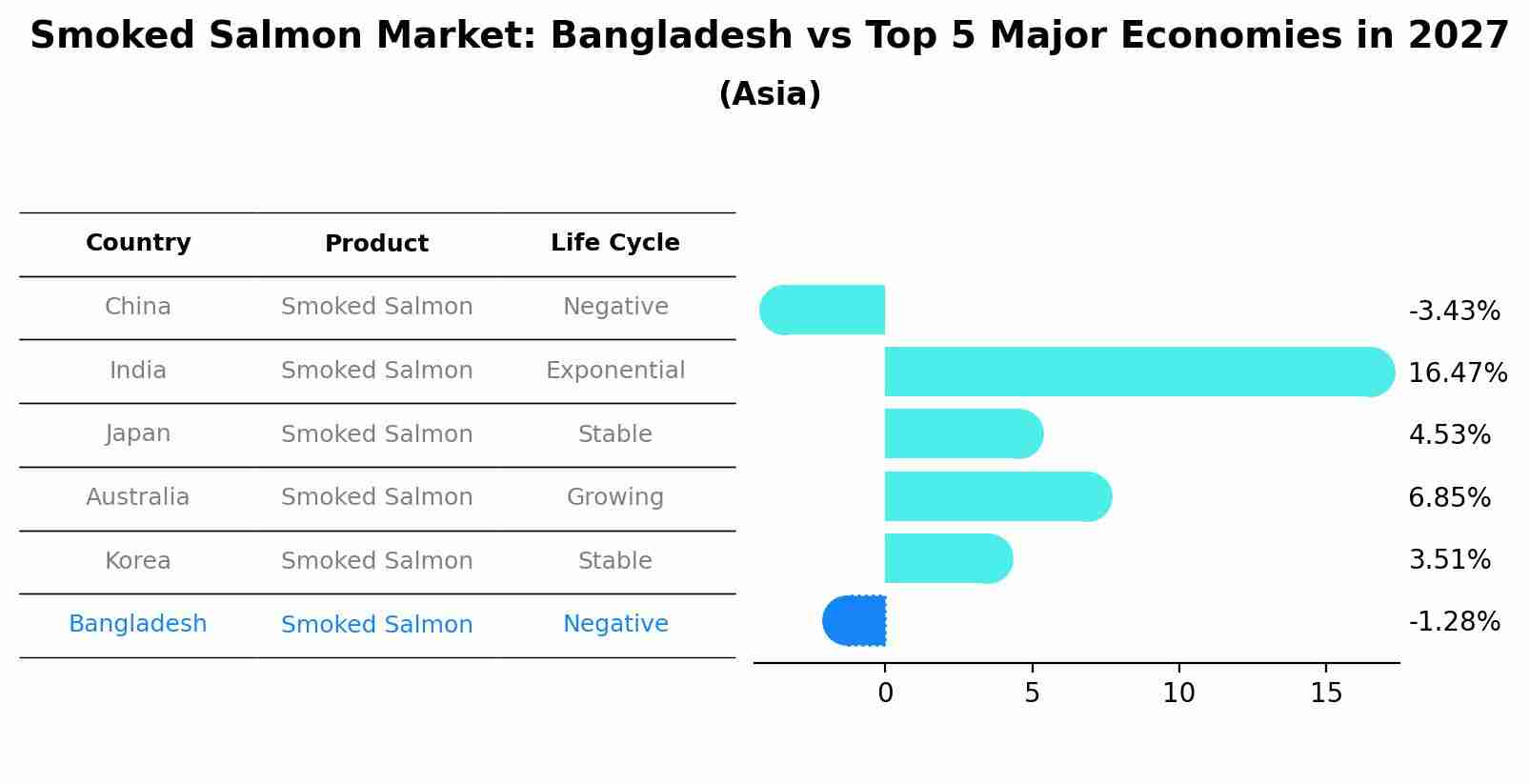Bangladesh Smoked Salmon Market (2025-2031) Outlook | Growth, Analysis, Value, Revenue, Trends, Industry, Companies, Share, Forecast & Size
| Product Code: ETC387872 | Publication Date: Aug 2022 | Updated Date: Jul 2025 | Product Type: Market Research Report | |
| Publisher: 6Wresearch | Author: Ravi Bhandari | No. of Pages: 75 | No. of Figures: 35 | No. of Tables: 20 |
Bangladesh Smoked Salmon Market Size Growth Rate
The Bangladesh Smoked Salmon Market could see a tapering of growth rates over 2025 to 2029. Although the growth rate starts strong at -1.09% in 2025, it steadily loses momentum, ending at -1.61% by 2029.

Smoked Salmon Market: Bangladesh vs Top 5 Major Economies in 2027 (Asia)
By 2027, the Smoked Salmon market in Bangladesh is anticipated to reach a growth rate of -1.28%, as part of an increasingly competitive Asia region, where China remains at the forefront, supported by India, Japan, Australia and South Korea, driving innovations and market adoption across sectors.

Bangladesh Smoked Salmon Market Synopsis
The Bangladesh smoked salmon market is a niche segment within the country`s seafood industry, with a growing demand for high-quality and premium smoked salmon products. Despite being a relatively small market compared to other countries, the consumption of smoked salmon is gradually increasing due to rising health consciousness and a growing appreciation for Western cuisine. The market is primarily driven by urban consumers, upscale restaurants, and hotels catering to a more affluent customer base. However, challenges such as limited awareness, availability, and high import costs of smoked salmon products hinder the market`s growth potential. As consumer preferences evolve and demand for healthy and gourmet food options rises, there is an opportunity for manufacturers and retailers to expand and diversify the smoked salmon offerings in Bangladesh to cater to a broader customer base.
Bangladesh Smoked Salmon Market Trends
The Bangladesh Smoked Salmon Market is experiencing a growing trend due to an increasing demand for premium seafood products among consumers looking for healthier and convenient food options. The market is witnessing a rise in the popularity of smoked salmon as a gourmet product, driven by a growing awareness of its health benefits and unique flavor profile. Consumers are also showing a preference for smoked salmon as a versatile ingredient that can be used in a variety of dishes, from salads to sandwiches and pasta. Additionally, the market is seeing a surge in the availability of different smoked salmon varieties and flavors to cater to diverse consumer preferences, further fueling the market growth.
Bangladesh Smoked Salmon Market Challenges
In the Bangladesh Smoked Salmon Market, some challenges include limited awareness and demand for smoked salmon products due to cultural preferences and dietary habits that may not traditionally include salmon as a staple food. Additionally, logistical challenges in terms of sourcing quality salmon, maintaining cold chain integrity, and ensuring proper storage facilities can impact the availability and quality of smoked salmon products in the market. Competition from other types of seafood offerings and the relatively higher cost of smoked salmon compared to local alternatives also pose obstacles for market penetration and growth. Overcoming these challenges would require targeted marketing efforts to educate and attract consumers, as well as establishing strong supply chain networks to ensure consistent availability of high-quality smoked salmon products in Bangladesh.
Bangladesh Smoked Salmon Market Investment Opportunities
The Bangladesh Smoked Salmon Market presents promising investment opportunities due to the growing demand for premium seafood products among the country`s affluent and health-conscious consumers. With a rising middle class and increasing disposable incomes, there is a growing interest in high-quality imported seafood products like smoked salmon. Investing in establishing or partnering with companies that can import and distribute smoked salmon in Bangladesh can be a lucrative opportunity. Additionally, there is potential for value-added products such as ready-to-eat smoked salmon snacks or meal kits to cater to the convenience-seeking urban population. By tapping into this niche market segment and offering innovative product offerings, investors can capitalize on the evolving consumer preferences in the Bangladesh smoked salmon market.
Jordan Agar Market Government Policies
The government of Bangladesh has implemented various policies related to the smoked salmon market to ensure food safety and quality for consumers. These policies include regulations on processing facilities to maintain hygiene standards, inspections to monitor the production process, and guidelines for labeling and packaging to provide accurate information to consumers. Additionally, the government may impose import/export restrictions and tariffs to protect local producers and control the market dynamics. These policies aim to promote the growth of the smoked salmon industry in Bangladesh while safeguarding the interests of consumers and ensuring compliance with international standards.
Bangladesh Smoked Salmon Market Future Outlook
The future outlook for the Bangladesh Smoked Salmon Market appears promising, with a projected growth trajectory driven by increasing consumer demand for high-quality seafood products and a growing awareness of the health benefits associated with salmon consumption. Factors such as changing dietary preferences, rising disposable incomes, and a shift towards healthier eating habits are expected to contribute to the market expansion. Additionally, advancements in food processing technologies and distribution channels are likely to improve accessibility to smoked salmon products among a wider consumer base. However, challenges such as price volatility, competition from alternative protein sources, and supply chain disruptions may impact market growth. Overall, the Bangladesh Smoked Salmon Market is anticipated to experience steady growth in the coming years, presenting opportunities for market players to capitalize on the evolving consumer preferences and market trends.
Key Highlights of the Report:
- Bangladesh Smoked Salmon Market Outlook
- Market Size of Bangladesh Smoked Salmon Market, 2024
- Forecast of Bangladesh Smoked Salmon Market, 2031
- Historical Data and Forecast of Bangladesh Smoked Salmon Revenues & Volume for the Period 2021 - 2031
- Bangladesh Smoked Salmon Market Trend Evolution
- Bangladesh Smoked Salmon Market Drivers and Challenges
- Bangladesh Smoked Salmon Price Trends
- Bangladesh Smoked Salmon Porter's Five Forces
- Bangladesh Smoked Salmon Industry Life Cycle
- Historical Data and Forecast of Bangladesh Smoked Salmon Market Revenues & Volume By Type for the Period 2021 - 2031
- Historical Data and Forecast of Bangladesh Smoked Salmon Market Revenues & Volume By Vac/Vacuum Packing for the Period 2021 - 2031
- Historical Data and Forecast of Bangladesh Smoked Salmon Market Revenues & Volume By Vac/Vacuum Packing Covered With Cardboard Envelope for the Period 2021 - 2031
- Historical Data and Forecast of Bangladesh Smoked Salmon Market Revenues & Volume By Canned Packaging for the Period 2021 - 2031
- Historical Data and Forecast of Bangladesh Smoked Salmon Market Revenues & Volume By Application for the Period 2021 - 2031
- Historical Data and Forecast of Bangladesh Smoked Salmon Market Revenues & Volume By Food Service Sector for the Period 2021 - 2031
- Historical Data and Forecast of Bangladesh Smoked Salmon Market Revenues & Volume By Retail Sector for the Period 2021 - 2031
- Bangladesh Smoked Salmon Import Export Trade Statistics
- Market Opportunity Assessment By Type
- Market Opportunity Assessment By Application
- Bangladesh Smoked Salmon Top Companies Market Share
- Bangladesh Smoked Salmon Competitive Benchmarking By Technical and Operational Parameters
- Bangladesh Smoked Salmon Company Profiles
- Bangladesh Smoked Salmon Key Strategic Recommendations
Frequently Asked Questions About the Market Study (FAQs):
- Single User License$ 1,995
- Department License$ 2,400
- Site License$ 3,120
- Global License$ 3,795
Search
Related Reports
- Australia IT Asset Disposal Market (2025-2031) | Strategy, Consumer Insights, Analysis, Investment Trends, Opportunities, Growth, Size, Share, Industry, Revenue, Segments, Value, Segmentation, Supply, Forecast, Restraints, Outlook, Competition, Drivers, Trends, Demand, Pricing Analysis, Competitive, Strategic Insights, Companies, Challenges
- UAE Building Thermal Insulation Market Outlook (2025-2031) | Revenue, Companies, Share, Trends, Growth, Size, Forecast, Industry, Analysis & Value
- Portugal Electronic Document Management Market (2025-2031) | Strategy, Consumer Insights, Analysis, Investment Trends, Opportunities, Growth, Size, Share, Industry, Revenue, Segments, Value, Segmentation, Supply, Forecast, Restraints, Outlook, Competition, Drivers, Trends, Demand, Pricing Analysis, Competitive, Strategic Insights, Companies, Challenges
- France Electronic Document Management Market (2025-2031) | Strategy, Consumer Insights, Analysis, Investment Trends, Opportunities, Growth, Size, Share, Industry, Revenue, Segments, Value, Segmentation, Supply, Forecast, Restraints, Outlook, Competition, Drivers, Trends, Demand, Pricing Analysis, Competitive, Strategic Insights, Companies, Challenges
- Portugal Occupational Health & Safety Services Market (2025-2031) | Strategy, Consumer Insights, Analysis, Investment Trends, Opportunities, Growth, Size, Share, Industry, Revenue, Segments, Value, Segmentation, Supply, Forecast, Restraints, Outlook, Competition, Drivers, Trends, Demand, Pricing Analysis, Competitive, Strategic Insights, Companies, Challenges
- Netherlands Occupational Health and Safety Services Market (2025-2031) | Strategy, Consumer Insights, Analysis, Investment Trends, Opportunities, Growth, Size, Share, Industry, Revenue, Segments, Value, Segmentation, Supply, Forecast, Restraints, Outlook, Competition, Drivers, Trends, Demand, Pricing Analysis, Competitive, Strategic Insights, Companies, Challenges
- Belgium and Luxembourg Facility Management Market (2025-2031) | Strategy, Consumer Insights, Analysis, Investment Trends, Opportunities, Growth, Size, Share, Industry, Revenue, Segments, Value, Segmentation, Supply, Forecast, Restraints, Outlook, Competition, Drivers, Trends, Demand, Pricing Analysis, Competitive, Strategic Insights, Companies, Challenges
- Russia Women Intimate Apparel Market (2025-2031) | Strategy, Consumer Insights, Analysis, Investment Trends, Opportunities, Growth, Size, Share, Industry, Revenue, Segments, Value, Segmentation, Supply, Forecast, Restraints, Outlook, Competition, Drivers, Trends, Demand, Pricing Analysis, Competitive, Strategic Insights, Companies, Challenges
- Africa Chocolate Market (2025-2031) | Size, Share, Trends, Growth, Revenue, Analysis, Forecast, industry & Outlook
- Global Hydroxychloroquine And Chloroquine Market (2025-2031) | Industry, Trends, Size, Outlook, Growth, Value, Companies, Revenue, Analysis, Share, Forecast
Industry Events and Analyst Meet
Our Clients
Whitepaper
- Middle East & Africa Commercial Security Market Click here to view more.
- Middle East & Africa Fire Safety Systems & Equipment Market Click here to view more.
- GCC Drone Market Click here to view more.
- Middle East Lighting Fixture Market Click here to view more.
- GCC Physical & Perimeter Security Market Click here to view more.
6WResearch In News
- Doha a strategic location for EV manufacturing hub: IPA Qatar
- Demand for luxury TVs surging in the GCC, says Samsung
- Empowering Growth: The Thriving Journey of Bangladesh’s Cable Industry
- Demand for luxury TVs surging in the GCC, says Samsung
- Video call with a traditional healer? Once unthinkable, it’s now common in South Africa
- Intelligent Buildings To Smooth GCC’s Path To Net Zero













